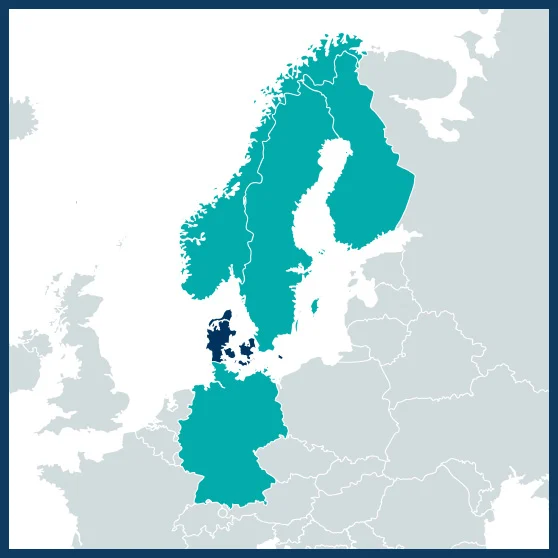01/03/2021 – 28/02/2024
€ 1,549,087
Head of Dept. Gary Banta
banta@biology.sdu.dk
Coordinator: Biology – University of Southern Denmark – Odense – Denmark
Bioscience – Aarhus University – Silkeborg and Aarhus – Denmark
Environmental and Marine Biology – Åbo Academy University – Åbo – Finland
Bioeconomy and Environment – Natural Resources Institute Finland (LUKE) – Joensuu – Finland
Plant Science and Microbiology – University of Hamburg – Hamburg – Germany
Circular Bioeconomy – SINTEF Ocean – Trondheim – Norway
Ecology, Environment and Plant Sciences – Stockholm University – Stockholm – Sweden

Globally salt marshes store over 50% of coastal “blue” carbon, (BC) and are responsible for 25-40% of global oceanic carbon storage. Coastal marshes in the Nordic region are largely understudied and differ substantially from “classic” macrotidal salt marshes. The Baltic Sea’s microtidal nature and strong salinity gradient means marsh vegetation changes from classic grass dominated marshes to salt meadows to brackish reed lagoons and coastal meadows. Very little is known about BC storage, greenhouse gas (GHG) emissions, habitat and biodiversity loss and ecosystem services in Nordic salt marshes under a changing climate. We also lack information about the extent and temporal dynamics of Nordic marshes, especially the vulnerability and adaptability of these ecosystems to climate change, local stressors, and management practices (e.g., livestock grazing). The strong regional salinity gradient is expected to have important effects on BC sequestration and GHG emissions due to shifts in plant communities and the expected increase methane release with lower salinities. Improving the understanding of biodiversity relationships, ecological functioning and ecosystem services provided by coastal Nordic habitats is essential for assessing their role in climate change mitigation and adaptation.
NordSalt will:
• Assess relationships between Nordic salt marsh plant community structure, biodiversity and carbon cycling, with focus on BC sequestration and GHG emissions.
• Explore historical changes in Nordic coastal marsh distribution and community biodiversity changes related to climatic and local pressures and management practices.
• Evaluate the potential of management of Nordic coastal marshes as Nature- based Solutions (NbS) in a local, regional, and global contexts.
NordSalt will fuse data from multiple sources, establishing a comprehensive inventory of Nordic salt marsh habitats. This will provide an assessment base of habitat classification types (EU, Nordic, national), spatial status, dominant plant communities, and present/future management options, including maps of the status of current salt marshes. We will assess environmental and anthropogenic pressures impacting marsh habitats in the Nordic region.
We further measure BC stocks and sequestration rates in salt marshes with grazed and ungrazed marsh plant communities. Methane emissions and net CO2 fluxes will be measured along coastal gradients. We will quantitively link plant biodiversity and community composition to C stocks, BC sequestration and GHG emissions along the Baltic Sea gradient, and experimentally test how plant functional diversity, fundamentally altered by grazing management practices, changes climate-related C cycling in a climate warming experiment.
NordSalt is centred around increasing public awareness of the ecological role and importance of these habitats for climate mitigation, biodiversity maintenance and coastal protection. Multiactor labs (MAL) will engage local and national policy makers, NGOs, landowners, scientific experts, administrators in policy management and other relevant actors to co-produce knowledge and understanding of Nordic ecosystem services and advise the project team in implementation strategies. Results will be synthesised and assessed as ecosystem services related to climate mitigation, biodiversity, and coastal protection provided by these habitats. NordSalt will advise end-users on actions to synergistically manage Nordic salt marshes as NbS to enhance climate protection, increase biodiversity and improve ecosystem services.